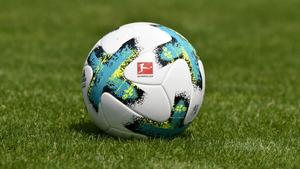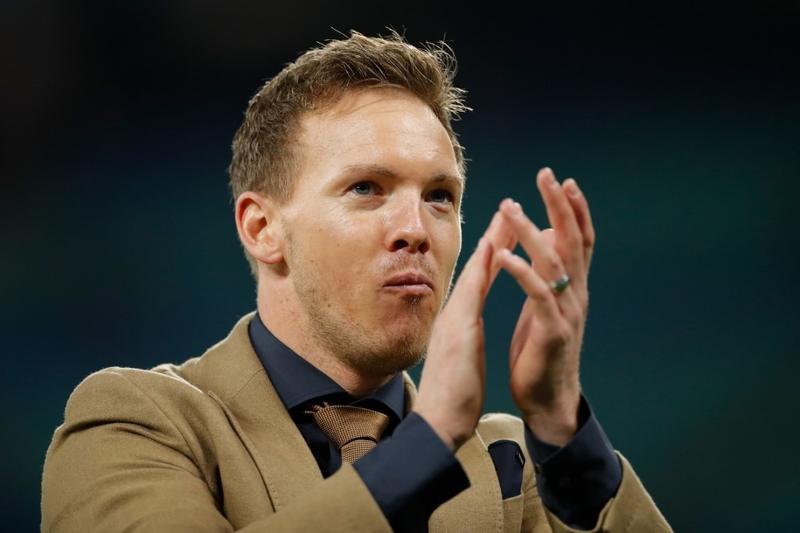 In this file photo taken on Aug 1, 2017 a ball with the logo of the German first division football league Bundesliga is seen on the pitch during a team presentation of the German first division Bundesliga football team SC Freiburg in Freiburg, southwestern Germany. (THOMAS KIENZLE / AFP)
In this file photo taken on Aug 1, 2017 a ball with the logo of the German first division football league Bundesliga is seen on the pitch during a team presentation of the German first division Bundesliga football team SC Freiburg in Freiburg, southwestern Germany. (THOMAS KIENZLE / AFP)
BERLIN - German football has been hit by a controversial debate about the effects of so-called "ghost games" ahead of the scheduled season restart on May 16.
While fans are preparing for weekend alone in front of their television sets, coaches and players are unsure about whether games behind closed doors are more of a curse or a blessing in disguise?
Leipzig coach Julian Nagelsmann is trying to see the positives. "It is as simple as this: Fans have to be replaced in this situation. The best way to deal with that is to accept it and see the positive effects," the 32-year-old commented.
ALSO READ: German ghost-game concept drawing worldwide attention
Nagelsmann believes players might concentrate much better on their primary tasks if fewer emotions are prevailing. The coach of the club based in eastern Germany is convinced crowds reactions usually influence players.
"Now, there is a chance to focus purely on footballing aspects. They can make decisions separate from emotions imported from the outside," Nagelsmann added.
Now, there is a chance to focus purely on footballing aspects. They can make decisions separate from emotions imported from the outside
Julian Nagelsmann, Coach, Leipzig
Nagelsmann asked fans not to misunderstand his opinion: "Dear fans, don't get this wrong. I'd love to have you in a packed arena."
The RB coach said he sees the remaining nine rounds of matches as something like a European Championship. "It doesn't feel like league competition anymore, more like a tournament. You have a break, a preparation phase, and then its kick-off."
Like Nagelsmann, the German national team's sports-psychologist Professor Hans-Dieter Hermann recommends turning the challenge into a chance.
He stresses players have to be aware that millions are watching. "Many things might happen with fewer emotions. Players have to remember that they can help secure the economic future of their clubs."
Players know the situation to play without fans from pre-season warm-up games. "As the ones on the bench replace the crowd, a new team spirit can be created," Hermann commented.
Players must keep in mind that they are in a competitive situation. "Mental preparation is important," he added. "This is like a new season."
 Leipzig's German headcoach Julian Nagelsmann celebrates after the UEFA Champions League football match between RB Leipzig and Tottenham Hotspur, in Leipzig, eastern Germany on March 10, 2020. (ODD ANDERSEN / AFP)
Leipzig's German headcoach Julian Nagelsmann celebrates after the UEFA Champions League football match between RB Leipzig and Tottenham Hotspur, in Leipzig, eastern Germany on March 10, 2020. (ODD ANDERSEN / AFP)
The majority of the 36 first and second division clubs are relying on the support of additional psychological staff.
Several teams have started to play practice matches in silence to simulate the situation ahead. Some have even kitted out the teams they are facing in the shirts of the upcoming opponents at the weekend.
The CEO of the German Football League (DFL) is facing an extremely challenging emergency situation. "What we are trying to do is far from orderly conditions. It's an emergency program," Christian Seifert emphasized.
Everyone has to be aware that, "We could well have to deal with setbacks, and everything has to get through it all," Seifert added.
The 2019/2020 season is planned to run until the end of June. Some experts predict it could even take until July should there be more infections. After two Dynamo Dresden players tested positive over the weekend, the club's restart against Hannover 96 has been postponed.
The local health authorities have ordered a 14-day quarantine for the entire playing staff and support personnel. In every one of the 16 federal states, the local health authorities are responsible for the duration of the quarantine period. If infection cases are taken as category 1 contacts, a 14-day-quarantine is inevitable. Type 2 only requires infected players to be isolated for seven days.
READ MORE: German football waits for Chancellor Merkel raising her thumbs up
"We are aware of the fragility of the concept. We can only deal with a limited amount of positive cases," Seifert said.
He called the recent results a setback but renewed the DFL's intention to proceed with "our plan".


